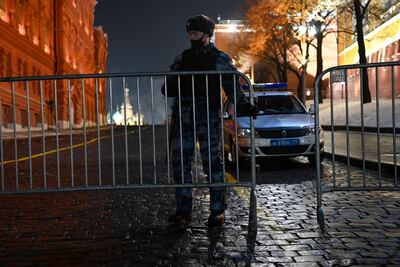A Moscow court on Tuesday sentenced Russian opposition leader Alexei Navalny to three and a half years in prison on charges that he breached the terms of his probation while he was recuperating in Germany from nerve-agent poisoning.
Navalny, a prominent critic of the Kremlin, denounced the proceedings as a vain attempt to scare millions of Russians into submission.
The prison sentence stems from a 2014 embezzlement conviction that he claims was fabricated.
Navalny, 44, was arrested on January 17 while returning from Germany after a five-month period of convalescence from poisoning, which he blames on the Kremlin.
Russian authorities deny any involvement.
As the order was read, Navalny pointed to his wife Yulia in the courtroom and traced the outline of a heart on the glass cage in which he was being held.
Earlier, he attributed his arrest to the Kremlin’s “fear and hatred”.
“The aim of that hearing is to scare a great number of people," Navalny said. “You can’t jail the entire country.”
Russia’s penitentiary service says Navalny breached the probation conditions of his suspended sentence on the money-laundering conviction.
It asked the Simonovsky District Court to turn his three-and-a-half-year suspended sentence into one that he must serve in prison. He has spent at least 10 months under house arrest. His lawyer Olga Mikhailova said he would now serve about two years and eight months in prison.
Navalny said the European Court of Human Rights ruled his 2014 conviction unlawful and Russia paid him compensation in line with the verdict.
He and his lawyers argued that while he was recovering in Germany from the poisoning, he could not register with Russian authorities in person as required by his probation.
Navalny insisted that his due process rights were breached during his arrest, and described his jailing as a travesty of justice.
“I came back to Moscow after I completed the course of treatment,” Navalny said at Tuesday’s hearing. “What else could I have done?”
His detention sparked protests across Russia in the past two weekends, with tens of thousands taking to the streets to demand his release.
Police detained more than 5,750 people on Sunday, including more than 1,900 in Moscow.
Most were released after being handed a court summons, and they face fines or jail terms of seven to 15 days.
Navalny's team called for another demonstration on Tuesday outside the Moscow courthouse but police were out in force, cordoning off nearby streets and making arrests.
More than 320 people were detained, according to the OVD-Info group, which monitors arrests.
Some of Navalny's supporters still managed to approach the building.
A young woman climbed a large pile of snow opposite the courthouse and held a poster with the message "Freedom to Navalny".
Less than a minute later, a police officer led her away.
In court, Navalny thanked protesters for their courage and urged other Russians not to fear repression.
“Millions can’t be jailed,” he said. “You have stolen people’s future and you are now trying to scare them. I’m urging all not to be afraid.”
After his arrest, Navalny’s team released a two-hour YouTube video featuring an opulent Black Sea residence allegedly built for Mr Putin.
The video has been viewed more than 100 million times.
Mr Putin insisted last week that neither he nor his relatives own any of the properties mentioned in the video, and his long-time confidant, building magnate Arkady Rotenberg, said he owned it.
As part of efforts to quell the protests, authorities focused on Navalny's associates and activists across the country.
His brother Oleg, top ally Lyubov Sobol and others were put under house arrest for two months and face criminal charges of breaching coronavirus restrictions.
Visiting Moscow on Tuesday, Swedish Foreign Minister Ann Linde, the current chair of the Organisation for Security and Co-operation in Europe, urged Russia to release Navalny and condemned the crackdown on protests.
EU foreign policy chief Josep Borrell, who will visit Moscow this week, criticised the detentions and the disproportionate use of force against protesters.
Russia dismissed US and EU criticism as meddling in its domestic affairs and said Navalny's situation was a procedural matter for the court, not an issue for the government.
More than a dozen western diplomats attended the hearing. Russian Foreign Ministry spokeswoman Maria Zakharova said their presence was part of efforts by the West to contain Russia.
Ms Zakharova said it could be an attempt to exert “psychological pressure” on the judge.
Kremlin spokesman Dmitry Peskov said Russia was ready for dialogue about Navalny, but insisted it would not take western criticism into account.
“We are ready to patiently explain everything but we aren’t going to react to mentor-style statements or take them into account,” Mr Peskov said.


